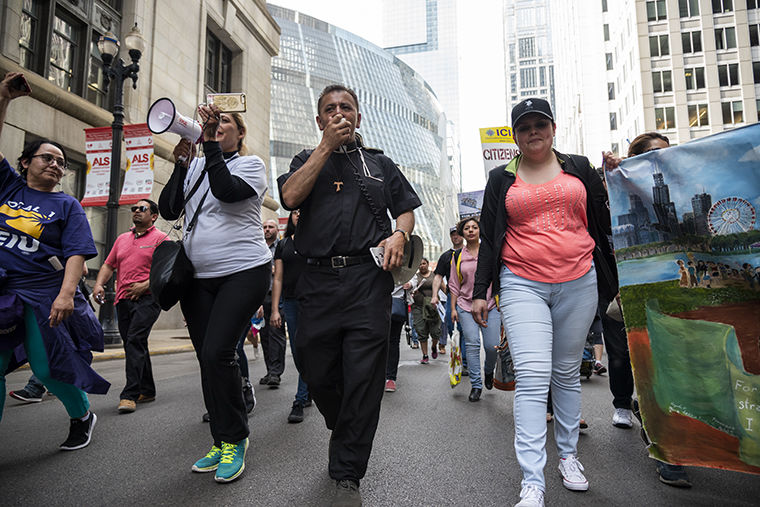Immigrant workers protest on May Day, insist policy change
May 5, 2018
Labor unions and immigration rights’ activists once again took to Chicago’s streets on International Worker’s Day to voice their struggles, demonstrate their strengths and demand change in immigrants and labor policies.
The May 1 rally began with a march organized by the HANA Center and Chicago Jobs with Justice. Several hundred people marched in solidarity from Haymarket Monument, 175 N. Desplaines St., to the Immigrant and Customs Enforcement office at Congress Parkway and Clark Street. Last year, the “Rally for Immigration Justice” attracted an estimated 20,000 people who marched throughout downtown May 1, 2017.
Among the marchers was Illinois Democratic gubernatorial candidate J.B. Pritzker, who told The Chronicle he attended in solidarity as a “longtime advocate for immigrant rights and standing up for our labor unions.”
Pritzker’s campaign has criticized President Donald Trump’s immigration policies, including a Muslim-majority, country-specific travel ban, attempts to end the Deferred Action on Childhood Arrivals program, deportation increases and proposals to sharply reduce the number of people allowed to immigrate to the U.S.
Pritzker has also criticized Gov. Bruce Rauner for being complacent with the Trump administration.
“[Rauner] wants to take away the rights of working people to organize,” Pritzker said of current Illinois labor policy. “[Rauner] stands against labor unions and stands with Donald Trump by virtue of his silence in the face of Trump’s desire to take away rights of immigrants.”
However, Rauner has signed legislation against the president’s policies. Rauner signed the Trust Act into law Aug. 28, 2017, which prohibits state law enforcement to stop, arrest, search, detain or continue to detain a person based solely on their immigration status, as reported Sept. 11, 2017, by The Chronicle.
But Pritzker said the Trust Act needs to be more strictly enforced and expanded.
“There is a great deal of fear in the Latino community. Many families [are] in hiding or fearful of their family members being deported,” Pritzker said. “We have to make sure that in Illinois we stand up for them, push back on the federal government and stand up for immigrant rights.”
Rayza Ortiz, a volunteer with Mujeres Latinas en Acción, said the organization came to the May Day protest to “resist, insist and persist” to make an impact for immigrant workers’ rights.
Although Ortiz is Puerto Rican and a legal citizen, she said she and all immigrant communities have to struggle with racial profiling and wage discrimination.
While Pritzker says there is fear in the Latino immigrant community, others says that fear is diminishing.
“A lot of [immigrants] are getting more conscious, learning about their rights,” Ortiz said. “A lot of them are not scared anymore.”
One in seven Illinois residents and more than 20 percent of all business owners in the Chicago metropolitan area are immigrants, according to the American Immigration Council. Along with the state’s Trust Act, Mayor Rahm Emanuel has initiated Chicago’s Welcoming City Ordinance and a Municipal ID card, called CityKey, to assist immigrants in the last year.
Martin Unzueta, director of the Chicago Community and Workers Rights who joined the May Day rally, said the work within his organization has changed since the beginning of the Trump administration. In the last year, Unzueta said he has been holding workshops to help inform the immigrant community about their rights.
“My feeling is that Illinois, in particular Chicago, is more protective about immigrants and undocumented immigrants than other cities in the United States,” Unzueta said, referring to the Trust Act and Chicago’s Welcoming City ordinance.
While the programs could improve, the community is worried about recent reports that Chicago’s gang database has wrongly included undocumented immigrants, putting them at risk of deportation, Unzueta said.
“We are going to continue fighting because every day [the administration] has a new idea about how to punish the community,” Unzueta said.








